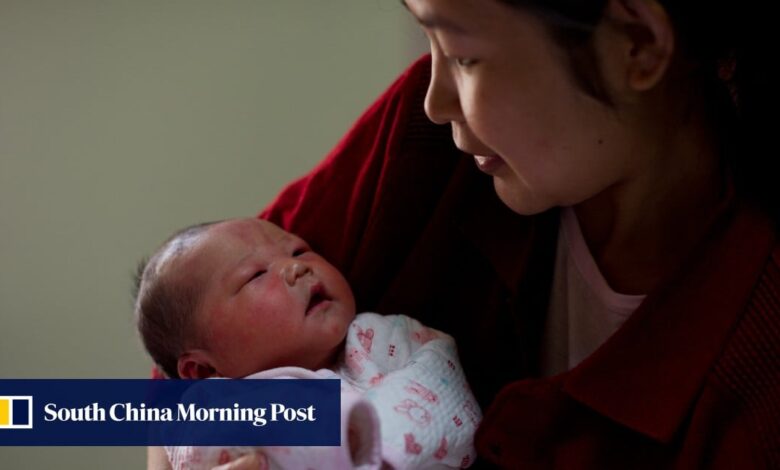Chinese scientists hope to extend female reproductive lifespan with naturally occurring substance

[ad_1]
“Future work is needed to test whether this approach can be safely and effectively translated to humans.”
The increasing average age of motherhood worldwide has posed challenges for reproductive medicine because advanced age leads to reduced ovarian reserves and declining egg quality.
Can’t make a baby? Check the man first – 50% of fertility issues down to them
Can’t make a baby? Check the man first – 50% of fertility issues down to them
The Organisation for Economic Co-operation and Development said all 38 member states have seen the mean age at which women first give birth increase this century, with most recording an increase of at least 2 years.
A female is born with all the eggs she will ever have. Researchers currently believe that women are born with 1 to 2 million eggs and the number gradually decreases in their lives, according to the US National Institute of Child Health and Human Development.
In the study, the scientists found that spermidine levels drop in the ovaries of aged mice, which also see a decline in the quality of their oocytes, or immature eggs, along with other signs of ovarian ageing.
Giving mice the substance helped increase spermidine levels in the ovaries and helped eggs grow and mature. It also boosted the ability for eggs to be used in a lab for fertilisation and improved early embryo formation, according to the study.
Lead author Xiong Bo, a professor at Nanjing Agricultural University’s college of animal science and technology who specialises in human and animal reproduction research, said age, overall health and diseases, genetics and environmental pollution are among the factors that affect egg quality.
“As scientists in basic research, our dream is to apply our findings in real life to help women of advanced maternal age who experience difficulties in natural conception,” Xiong said.
“Egg quality is key to performing in vitro fertilisation (IVF), just like planting a good-quality seed for it to bloom. That is why we need to improve and recover the quality of eggs,” he said, adding that spermidine supplementation was also shown to help oocytes mature in vitro.
The team will continue to work on the research and design of clinic trials to determine whether the treatment can be safely and effectively applied to humans, as well as the optimal dose to be taken.
China adds fertility services to insurance scheme amid record low birth rate
China adds fertility services to insurance scheme amid record low birth rate
Xiong said while the supplement is available on the market, consumers might not attain desired results from taking them without proper directions because lab animal studies have shown that excessive intake could negatively affect egg quality.
“We should be cautious with applications in humans,” he said.
Alex Polyakov, a clinical associate professor in the faculty of medicine, dentistry and health sciences at the University of Melbourne who is not involved in the study, said the latest research is “groundbreaking in its scope and complexity”.
Polyakov, who also serves as the clinical director of Melbourne IVF at the Royal Women’s Hospital, told the Australian Science Media Centre that the Chinese team appears to have discovered a “holy grail” in reproductive medicine.
“As women age, the quality and the number of oocytes available for fertilisation, either in the context of fertility treatment such as IVF or while attempting a natural conception, are diminishing,” he said, adding that the loss of good-quality oocytes accelerates around the mid to late 30s.
“While tremendous advances in fertility treatments over the past few decades resulted in drastically improved IVF success rates, female age remains the main obstacle to success since IVF cannot counteract the effects of age on the quality and quantity of oocytes that can be obtained.”
He said spermidine is a compound found in cells that “plays diverse roles in both health and disease”.
China’s ‘newborn normal’ expected to hit 10 million as ageing trends continue
China’s ‘newborn normal’ expected to hit 10 million as ageing trends continue
“Although spermidine supplements are available, their effectiveness and safety in humans are still under investigation.” Polyakov added.
“A balanced diet rich in fruits, vegetables, and whole grains can naturally provide sources of spermidine.”
Echoing Xiong, Polyakov said further research is required to apply these findings to human reproduction because “what appears to have an effect on other species does not always translate into a useful therapy in humans”.
[ad_2]
Source link






